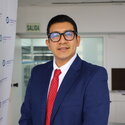Democracy
Democracy Day commemorated at the International University of Ecuador

Academic space for the exchange of ideas in favor of strengthening democratic institutions in Ecuador and Latin America.
Last September 15, in the Hemicycle of the Latin American Faculty of Social Sciences (FLACSO), Ecuador, the International Relations Laboratory (IR-LAB), led by Santiago Carranco, was the venue for the Democracy Day event, in collaboration with the School of International Relations of the UIDE and the Friedrich Naumann Stiftung Foundation for the Andean Countries. This event focused on generating an academic space for exchanging ideas to empower democratic institutions in Ecuador and Latin America. It also sought to involve UIDE students and members of civil society in debates on the importance of democracy for the country and community.

Professor Santiago Carranco, Ph.D. (c), kicked off the event by calling attention to the joint efforts of the Friedrich Naumann Stiftung Foundation and the IR-LAB to commemorate Democracy Day and reinforce democracy. Later, José Muñoz, project coordinator of the Foundation, acknowledged the School of International Relations for organizing this macro event and highlighted that the defense of democracy for freedom worldwide is a fundamental axis of the political foundations for freedom. Meanwhile, Arturo Moscoso, Director of the School of International Relations, expressed his gratitude to Flacso Ecuador for hosting the event at its headquarters and to the Friedrich Naumann Foundation for supporting academic initiatives in favor of democratic societies.
"The defense of democracy for freedom at the global level is a fundamental axis of political foundations for freedom."


Typical factors of Latin American politics
A keynote lecture entitled Politics in Latin America in Pandemic Times, presented by Professor Manuel Alcántara Sáez, followed the event's opening. The professor addressed the crisis of representation, the crisis of political parties, and hyper-presidentialism as distinguishing factors of Latin American politics.
Next, the panel "Challenges of democracy in Ecuador: The present and future of democratic institutions in the country and the region" was opened with the participation of renowned academics in political studies Carolina Curvale, Santiago Basabe, and Simón Pachano, professors at Flacso Ecuador; Arturo Moscoso, director of the School of International Relations at UIDE and María José Castro, a political consultant.
Key role of citizen participation in the improvement of political culture
In this panel, the specialists analyzed the challenges of democracy in terms of fragmentation and polarization, the weakness of political institutions, endogenous and exogenous threats to democracy, and the existence of anti-democratic actors worldwide. Furthermore, they emphasized the essential role of citizen participation and the enhancement of political culture for defending democracy and the corresponding guarantee of rights and freedoms.
During the event, a Tik Toks contest was played with the theme: " How do I commit myself to strengthen democracy?" These videos were recorded during the initial session and shared through social networks so that more people know about Democracy Day. The students who circulated their videos received prizes sponsored by the Friedrich Naumann Stiftung Foundation to boost their support for democracy.
Final considerations
The session closed with final questions and a brief review of the points raised throughout the event. The event, moderated by Cristian Bravo, professor at the School of International Relations, provided a space for the exchange and expansion of knowledge and ideas crucial for civil society and academia to consolidate and work as advocates of democracy.
Event impressions




